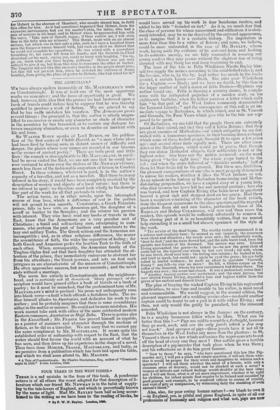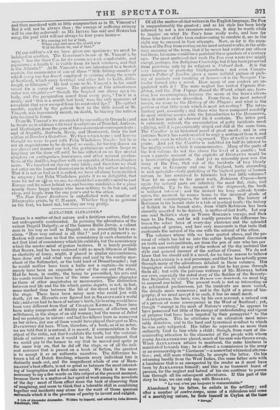FOUR YEARS IN THE WEST INDIES.* THERE is a sad
mistake in the form of this book. A ponderous octavo is of all others the worst adapted for that description of literature which our friend Mr. NEWMA.N is in the habit of supply ing to the tale-lovers of England, and which is proverbially known by the 'name of light. Had Mr. BAYLEY been hall' as long accustomed to the writing as we have been to the reading of books, he .• By P. W. N. Bayley, London, 1830. would have served up his work in four handsome twelves, and added to his title " founded on fact." As it is, we much fear that the class of persons for whose amusement and edification it is obvi ously intended, may be so far deceived by the outward appearance, as to imagine that it is a veritable history. No imputation is more fatal than this to a writer of fiction ; and none, we believe, could be more unfounded in the case of Mr. BAYLEY, whose work, laying aside the evidence of its outward form, and looking to its contents merely, we are fully warranted in assuring our young readers they may peruse without the slightest fear of being shocked with any thing too real from beginning to end. The hero of the tale is Felix Wladislaus 'is' Ticolo Bayley himself (we supply the names according to the established rules ); and the heroine, who is, by the by, kept rather too much in the back ground, a certain Laura Dash. She cuts poor Wladislaus for a Captain — Dash ; and we have no doubt, by this time ie the happy mother of half a dozen of little Dashes—Hyphens our author would say. Felix is dancing a country dance, in compli ance with the antiquated prejudice of a maiden aunt, on his eighteenth birthday, when his lather receives a letter which calls him " to that part of the West Indies commonly denominated the Leeward Islands ;" and the consequence of this call is an immediate voyage to Barbadoes, in which island, and in St. Vincent and Grenada, the Four Years which give title to the tale are supposed to be spent. Of Barbadoes, we are told that the people there are extremely proud of their island, and that they call it Little Britain ; that they are great enemies of Methodists,—of which antipathy we are fur nished with a humorous specimen, in t heir burning down a chapel which some of these foolish people thought fit to open a few years ago ; and several other facts equally new. There are other anecdotes of the Barbadians, which would go to prove, that though they can storm Methodist chapels, their soldiership is not of the highest order. Our hero saw the militia reviewed: on the word being given "to the right thee," the whole corps turned to the kit; and when the order followed of "shoulder muskets," half of them let their fusils fall to the ground. But these are, doubtless, the pleasant exaggerations of one who is most properly determined to amuse his readers, whether it likes the -West Indians or not. As an episode iu the history of Barbadian home-loving and Methodist-hating propensities, we have a capital story of a young lady, who died because her lover left her and married another ; how she was buried, and how Captain Elving (the fickle lover in question) heaved a great sigh and dropped dead on her grave. Had there been a suspicion remaining of the character of the book (which, from the frequent recurrence to the slave question and the repeated quotations from old and rare books, particularly those of Mr. Bencenv and Bishop COLERIDGE, will now and then cross the reader), this episode would be sufficient effectually to remove it. The closing part of it is so beautifully written, that we cannot help extracting it as a small but chosen specimen of the style of the work.
"The service of the dead began. The worthy rector pronounced it in a solemn and emphatic tone : he seemed as one inspired; the mourners were silent and attentive ; the words were said ; the melancholy words, dust tollust ;' and the tears flowed fast, and the sobs burst loud, from the parents and friends of the deceased. The service was over. Edward Elving approached the grave—he looked in—he saw the great clods of earth fall on the injured one whom he had once loved ; his wife, whom. he now loved, stood near him : his feeling was intense; he looked at her, and tried to speak, but could not again he eyed the grave; his eye-balls rolled in fearful wildness ; he made an effort to ejaculate Farewell, Fanny 1' and fell—to rise no more ! He fell, a lifeless corpse on the coffin of the Deserted, -whom his own inconstancy had driven there. The tragedy was over ; the scene had closed. It was a melancholy scene that 1 " Another funeral service was performed; and the once joyous, but now attered Fanny Eying, departed n lone and hapless widow from the grave of her earliest and dearest friend."
The plan of burying the wicked Captain Elving in his regimental smallclothes, to save -time and trouble to his widow, is most novel and commendable. We would suggest, in the second edition, the pleasant improvement of a wedding service also—no doubt another captain could be found to act a part in it with widow Elving; and thus, not only would the guilty be punished, but the innocent consoled.
Felix Wladislaus is not always in the dumps : on the contrary, he is a mighty humorous fellow when he likes. 'What can be better than this ?—" Pigs are said to resemble a fortnight, because they go week, week, and are the only jewels which a Jew may not touch." And apropos of pigs—these jewels have it not all to themselves in the West Indies any more than the planters : in St. Vincent's there is a law which authorizes the negro convicts to cut off the head of every one they meet ! Our author gives a terrible description of a pig-murder that took place when he was there ; and his reflections on it do him great honour. "Now to those," he says, "who have sanctioned this law (the Pig.: murder Act), I will put a plain and simple question ;I will ask them whether it would be proper for their wives and daughters to witness such a, spectacle? I will ask them whether the mind of a female, with only a common sense of decency, would not be shocked at such a scene? a woman of delicate and relined feelings would shudder at the bare idea; and I will ask them, what is of yet more importance, whether it be right for children, for infant minds that require to be formed and moulded by good precept and example, to be rendered callous to scenes of cruelty, and void of pity or compassion, by witnessing daily the shedding of even animal's blood.'
Alas, alas, for poor erring human nature !—.we blush to own it —in England, yes, in pitiful and pious England, in spite of all our professions of humanity and religion and what not, pigs are now and then murdered with as little compunction as in St.. Vincent's ! But it will not be always thus ; the wrongs of suffering swmery will be one day redressed : as Mr. IRVING has said and BURNS has sung, the year 1834 will not always be four years hence . It's coming yet for a' that,
When pigs and men the world o'er Will brethren be, and a' that."
Of our author's wit we have given one specimen : we must be indulged in another. The Governor's house at St. Vincent's, he says,'" has the three C.s, for its rooms are cool, comfortable, and capacious ; a fourth C is visible from its back windows, and that is the Atlantic !" At St. Vincent's we are introduced to a Scotch captain, the commander of one of those " little fishing-smacks of which every one has heard, employed in cruising along the coasts Of Scotland, which carry herring's and other fish to Leith, Edinburgh, or Glasgow." He had come to St. Vincent's in his small vessel for a cargo of sugar. The patience of this adventurous sailor was singular ;—" though the tropical sun shone upon his body, and the perspiration oozed from every pore, I'm a' in a muck,' and this is a muchle hot land,' were the only murmurs of complaint that ever escaped from his contented lips !" The epithet muchle, applied by the patient Scot to the little island of St. Vincent, was ingeniously meant, no doubt, to blarney the natives into favourable terms.
From St. Vincent's we are carried by our author to Grenada ; and he treats us in addition with brief descriptions of Trinidad, Antieua, and Martinique, from the pens of three convenient correspondents ; and of Anguilla, Barbuda, Nevis, and Montserrat, from the last edition ofBrookes's Gazetteer. We then return home ; and here we thought \we were to part with Felix Wladislaus Nicol° : but he is not an acquaintance to be dropped so easily, for having drawn on our gloves and donned our hat, the pertinacious author keeps us lingering on the doorsill until he has inflicted on us five mortal chapters on earthquakes, hurricanes, and other natural productions of the Antilles, together with an appendix of thirteen chapters more. We touched on slavery very lately, and therefore we shall not enter on the learned discussions in which the author indulges. That it is not so had as it is called, we have all along been inclined to suppose ; but Felix Wladislaus paints it as so delightful, that were we not so (V as we are, we should feel a month's Mind to cast Europe and its cares behind us, and become candidates for a place among those happy beings who have nothing to do but eat, and sleep, and laugh, from the one year's end to the other. The Four Years' Residence is embellished with a number of lithographic prints, by C. RAGHE. Whether they be as genuine as the text, we know not, but they are very pretty.



























 Previous page
Previous page